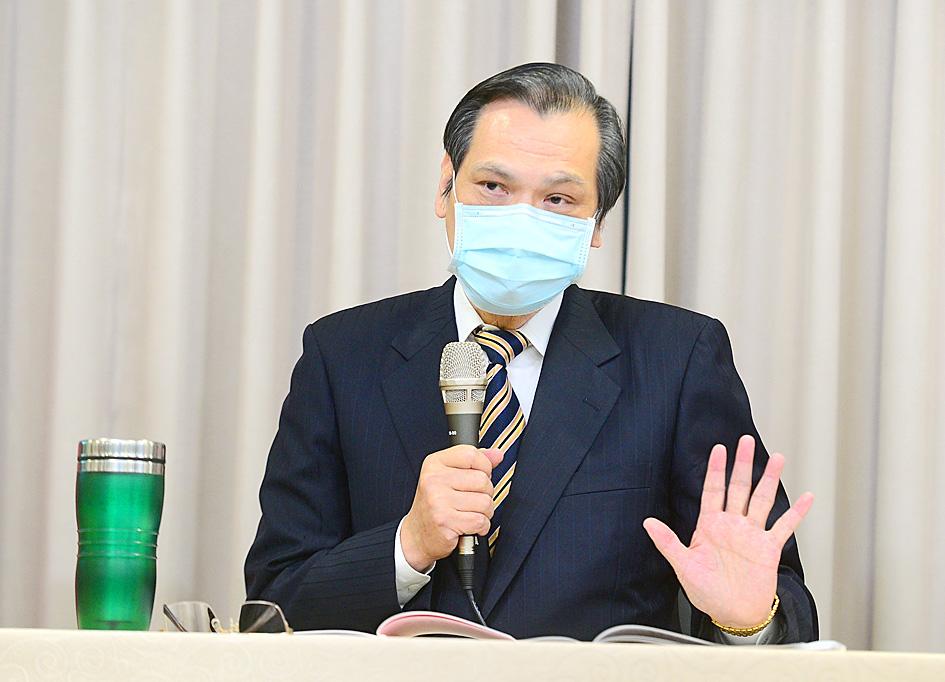The government’s Hong Kong Humanitarian Aid project is to be implemented through a Taiwan-Hong Kong Interaction Office, which is to begin operations on July 1, Mainland Affairs Council (MAC) Minister Chen Ming-tong (陳明通) said yesterday.
The aid plan has been anticipated since China’s National People’s Congress last month endorsed national security legislation for Hong Kong, despite Beijing’s past promise that the territory would remain autonomous until 2047.
The new office is a special agency to assist Hong Kongers with study, investment and entrepreneurial interests, seeking employment or emigrating to Taiwan, Chen told a news briefing in Taipei as he unveiled the government’s plan for helping Hong Kongers.

Photo: Wang Yi-sung, Taipei Times
Established under the Taiwan-Hong Kong Economic and Cultural Cooperation Council, the new office would also assist international companies setting up branches in Taiwan, he added.
The office is to render humanitarian aid to Hong Kongers, while complying with Taiwan’s laws and upholding national security, he said.
The project’s implementation fully embodies the government’s support of Hong Kongers’ efforts to uphold human rights and defend the values of democracy, and its goodwill toward them, he said.
President Tsai Ing-wen (蔡英文) yesterday also reaffirmed her commitment to support Hong Kongers.
Whether reacting to the territory’s extradition bill last year or the national security legislation being imposed by Beijing, Taiwanese have empathized with Hong Kongers’ insistence on freedom and democracy, she wrote on Facebook.
In addition to condemnation of China’s encroachment on Hong Kong’s democracy and human rights, the nation would continue to employ institutional power to provide Hong Kongers with practical support and assistance, she wrote.
After a Chinese academic cited Taipei Mayor Ko Wen-je (柯文哲) as a “pro-unification force,” MAC Deputy Minister Chiu Chui-cheng (邱垂正) said that the council does not respond to the opinions of individuals.
The article, written by Shanghai Institute of Taiwan Studies deputy director Ni Yongjie (倪永杰), urged Beijing to utilize forces in Taiwan that advocate unification and “guide them toward the path of cross-strait negotiations.”
The council calls on the public not to fall into traps set by the Chinese Communist Party, which attempts to expedite unification through means disguised as “democratic negotiations,” Chiu said.
Additional reporting by Chung Li-hua

‘FORM OF PROTEST’: The German Institute Taipei said it was ‘shocked’ to see Nazi symbolism used in connection with political aims as it condemned the incident Sung Chien-liang (宋建樑), who led efforts to recall Democratic Progressive Party (DPP) Legislator Lee Kun-cheng (李坤城), was released on bail of NT$80,000 yesterday amid an outcry over a Nazi armband he wore to questioning the night before. Sung arrived at the New Taipei City District Prosecutors’ Office for questioning in a recall petition forgery case on Tuesday night wearing a red armband bearing a swastika, carrying a copy of Adolf Hitler’s Mein Kampf and giving a Nazi salute. Sung left the building at 1:15am without the armband and apparently covering the book with a coat. This is a serious international scandal and Chinese

PERSONAL DATA: The implicated KMT members allegedly compiled their petitions by copying names from party lists without the consent of the people concerned Judicial authorities searched six locations yesterday and questioned six people, including one elderly Chinese Nationalist Party (KMT) member and five KMT Youth League associates, about alleged signature forgery and fraud relating to their recall efforts against two Democratic Progressive Party (DPP) legislators. After launching a probe into alleged signature forgery and related fraud in the KMT’s recall effort, prosecutors received a number of complaints, including about one petition that had 1,748 signatures of voters whose family members said they had already passed away, and also voters who said they did not approve the use of their name, Taipei Deputy Chief Prosecutor

UNDER ATTACK: Raymond Greene said there were 412 billion malicious threats in the Asia-Pacific region in the first half of 2023, with 55 percent targeting Taiwan Taiwan not only faces military intimidation from China, but is also on the front line of global cybersecurity threats, and it is taking action to counter those attacks, President William Lai (賴清德) said yesterday. Speaking at the opening of this year’s Cybersec Expo in Taipei, the president assured foreign diplomats and exhibitors that Taiwan remained committed to strengthening its defense against cyberattacks and enhancing the resilience of its digital infrastructure. Lai referenced a report from the National Security Bureau (NSB) indicating that the Government Service Network faced an average of 2.4 million intrusion attempts daily last year, more than double the figure

Retired US general Robert B. Abrams reportedly served as adviser to Chief of the General Staff Admiral Mei Chia-shu (梅家樹) during the Ministry of National Defense’s computer-simulated war games in the buildup to this year’s 41st annual Han Kuang military exercises, local media reported yesterday. For 14 days and 13 nights starting on April 5 and ending yesterday, the armed forces conducted the computer-simulated war games component of the Han Kuang exercises, utilizing the joint theater-level simulation system (JTLS). Using the JTLS, the exercise simulated a continuous 24-hour confrontation based on scenarios such as “gray zone” incursions and the Chinese People’s Liberation